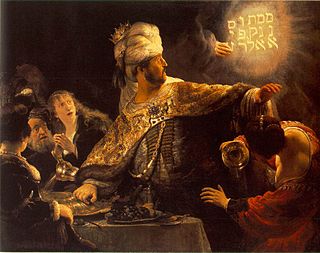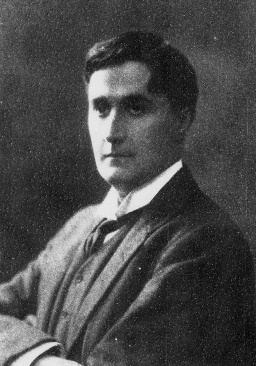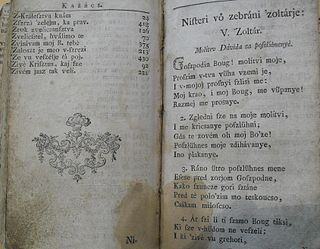Related Research Articles
"Land of Hope and Glory" is a British patriotic song, with music by Edward Elgar, written in 1901 and with lyrics by A. C. Benson later added in 1902.

Belshazzar's Feast is a cantata by the English composer William Walton. It was first performed at the Leeds Festival on 8 October 1931, with the baritone Dennis Noble, the London Symphony Orchestra and the Leeds Festival Chorus, conducted by Malcolm Sargent. The work has remained one of Walton's most celebrated compositions. Osbert Sitwell selected the text from the Bible, primarily the Book of Daniel and Psalm 137. The work is dedicated to Walton's friend and benefactor Lord Berners.

Psalm 89 is the 89th psalm of the Book of Psalms, beginning in English in the King James Version: "I will sing of the mercies of the LORD for ever". In the slightly different numbering system used in the Greek Septuagint and Latin Vulgate translations of the Bible, this psalm is Psalm 88. In Latin, it is known as "Misericordias Domini in aeternum cantabo". It is described as a maschil or "contemplation".
A coronation anthem is a piece of choral music written to accompany the coronation of a monarch.

Hodie is a cantata by Ralph Vaughan Williams. Composed between 1953 and 1954, it is the composer's last major choral-orchestral composition, and was premiered under his baton at Worcester Cathedral, as part of the Three Choirs Festival, on 8 September 1954. The piece is dedicated to Herbert Howells. The cantata, in 16 movements, is scored for chorus, boys' choir, organ and orchestra, and features tenor, baritone, and soprano soloists.

The Five Mystical Songs are a musical composition by English composer Ralph Vaughan Williams (1872–1958), written between 1906 and 1911. The work sets four poems by seventeenth-century Welsh poet and Anglican priest George Herbert (1593–1633), from his 1633 collection The Temple: Sacred Poems. While Herbert was a priest, Vaughan Williams himself was an atheist at the time, though this did not prevent his setting of verse of an overtly religious inspiration. The work received its first performance on 14 September 1911, at the Three Choirs Festival in Worcester, with Vaughan Williams conducting.

Coronations were held in Norway from 1164 to 1906, mostly in the Nidaros Cathedral in Trondheim. Although a crowning ceremony was formerly mandated by the nation's constitution, this requirement was eliminated in 1908. However, Norwegian kings have since chosen voluntarily to take part in a ritual of "benediction" to mark their accession to the throne, during which the crown is present, but not physically bestowed upon the sovereign. The new ceremony retains some of the religious elements of earlier rites, while eliminating other features now considered to be "undemocratic". There is no law preventing a coronation from occurring so any future monarch of Norway can choose to have one.
Psalm 90 is a musical composition by the American composer and insurance executive Charles Ives, written in 1923–24.

The Festival Te Deum is the popular name for an 1872 composition by Arthur Sullivan, written to celebrate the recovery of Albert Edward, Prince of Wales from typhoid fever. The prince's father, Prince Albert, had died of typhoid fever in 1861, and so the prince's recovery was especial cause for celebration.

The Light of the World is an oratorio composed in 1873 by Arthur Sullivan. Sullivan wrote the libretto with the assistance of George Grove, based on the New Testament. The work was inspired by William Holman Hunt's popular 1853–54 painting, The Light of the World. The story of the oratorio follows the whole life of Christ, told mostly in the first person, focusing on his deeds on Earth as preacher, healer and prophet.

The Te Deum for the Victory at the Battle of Dettingen in D major, HWV 283, is the fifth and last setting by George Frideric Handel of the 4th-century Ambrosian hymn, Te Deum, or We Praise Thee, O God. He wrote it in 1743, only a month after the battle itself, during which Britain and its allies Hannover and Austria soundly routed the French.

The accession of the King of France to the royal throne was legitimized by a ceremony performed with the Crown of Charlemagne at the Reims Cathedral. In late medieval and early modern times, the new king did not need to be anointed in order to be recognized as French monarch but ascended upon the previous monarch's death with the proclamation "Le Roi est mort, vive le Roi!"

The coronation of the emperor of Russia from 1547 to 1917, was a highly developed religious ceremony in which they are crowned and invested with regalia, then anointed with chrism and formally blessed by the church to commence his reign. Although rulers of Muscovy had been crowned prior to the reign of Ivan III, their coronation rituals assumed overt Byzantine overtones as the result of the influence of Ivan's wife Sophia Paleologue, and the imperial ambitions of his grandson, Ivan the Terrible. The modern coronation, introducing "Western European-style" elements, replaced the previous "crowning" ceremony and was first used for Catherine I in 1724. Since tsarist Russia claimed to be the "Third Rome" and the replacement of Byzantium as the true Christian state, the Russian rite was designed to link its rulers and prerogatives to those of the so-called "Second Rome" (Constantinople).

Psalm 5 is the fifth psalm of the Book of Psalms, beginning in English in the King James Version: "Give ear to my words, O LORD, consider my meditation". In Latin, it is known as "Verba mea auribus percipe Domine". The psalm is traditionally attributed to David. It reflects how the righteous man prays for deliverance not only for freedom from suffering, but to allow himself to serve God without distraction. The New King James Version entitles it "A Prayer for Guidance".

Psalm 80 is the 80th psalm of the Book of Psalms, beginning in English in the King James Version: "Give ear, O Shepherd of Israel, thou that leadest Joseph like a flock". In the slightly different numbering system used in the Greek Septuagint and Latin Vulgate translations of the Bible, this psalm is Psalm 79. In Latin, it is known as "Qui regis Israel intende". It is one of the 12 Psalms of Asaph. The New American Bible calls it "a prayer for Jerusalem". The Jerusalem Bible describes it as "a prayer for the restoration of Israel".

Utrecht Te Deum and Jubilate is the common name for a sacred choral composition in two parts, written by George Frideric Handel to celebrate the Treaty of Utrecht, which established the Peace of Utrecht in 1713, ending the War of the Spanish Succession. He composed a Te Deum, HWV 278, and a Jubilate Deo, HWV 279. The combination of the two texts in English follows earlier models. The official premiere of the work was on 13 July 1713 in a service in St Paul's Cathedral in London.

Messiah, the English-language oratorio composed by George Frideric Handel in 1741, is structured in three parts. This listing covers Part II in a table and comments on individual movements, reflecting the relation of the musical setting to the text. Part I begins with the prophecy of the Messiah and his birth, shows the annunciation to the shepherds and reflects the Messiah's deeds on earth. Part II covers the Passion in nine movements including the oratorio's longest movement, an air for alto He was despised, then mentions death, resurrection, ascension, and reflects the spreading of the Gospel and its rejection. The part is concluded by a scene called "God's Triumph" that culminates in the Hallelujah chorus. Part III of the oratorio concentrates on Paul's teaching of the resurrection of the dead and Christ's glorification in heaven.

Sing Unto God, is an anthem composed by George Frideric Handel. It was performed for the royal wedding on 27 April 1736 at the Chapel Royal in St James's Palace, London with Francesca Cuzzoni-Sandoni, Carlo Broschi "Farinelli", and Francesco Bernardi "Senesino". The text was adapted from verses of Psalms 68, 106 and 128.

The Te Deum in D major, "Queen Caroline" is a canticle Te Deum in D major composed by George Frideric Handel in 1714.
References
- Kennedy, Michael (1987). Portrait of Elgar (Third ed.). Oxford: Clarendon Press. ISBN 0-19-284017-7.
- Moore, Jerrold N. (1984). Edward Elgar: a creative life. Oxford: Oxford University Press. ISBN 0-19-315447-1.